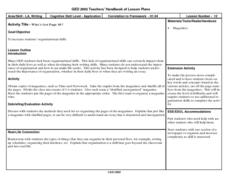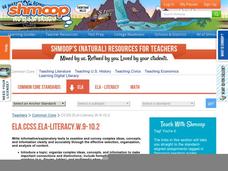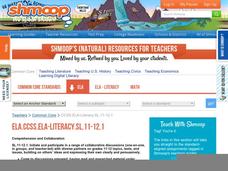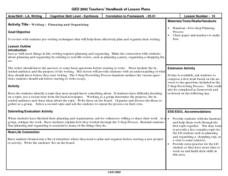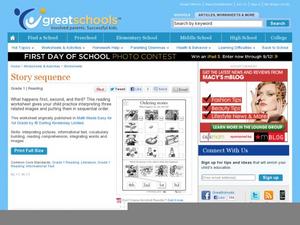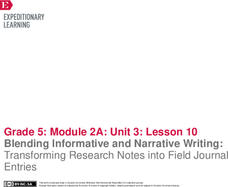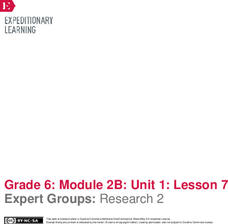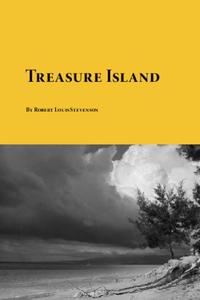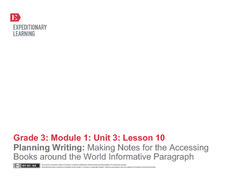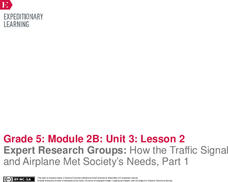Core Knowledge Foundation
Unit 1: Contemporary Fiction - They Call Me Güero: A Border Kid’s Poems by David Bowles
They Call Me Güero: A Border Kid's Poems by David Bowles is the focus of a five-week language arts unit unit. Fifth graders listen to various poems and participate in thoughtful discussions, examining vocabulary and learning new words in...
Curated OER
Who's Got Page 10?
Young scholars participate in an activity that is aimed at increasing their organizational skills. They reorganize magazines that have been taken apart and scrambled.
Polk Bros Foundation
I Can Identify a Nonfiction Writer's Main Idea and Supporting Examples
Use this page to quickly identify the central idea of a text and organize ideas for writing an informational or explanatory text. The worksheet is split into two parts. In the first part, pupils note down the main idea and supporting...
Curated OER
Final Topic Selection
Read The Quicksand Book by Tomie dePaola while taking notes about the story. Perform a read-aloud, and work your way through the text with your youngsters. With this plan, learners also write about ideas from a previous day, and detail...
Curated OER
Tell Me More
Fifth graders demonstrate research techniques in addition to endeavoring to display focus and stay on topic. Using books and stories, they gather, organize, and share information about a topic. Additionally, they explain to the class...
Shmoop
ELA.CCSS.ELA-Literacy.W.9-10.2
The details in the new Common Core standard for producing informative/explanatory texts is different from what you have in your current curriculum, and now you are confused on what to do. Keep calm and carry on, because not only does...
Shmoop
ELA.CCSS.ELA-Literacy.SL.11-12.1
You want your class to meet all of the Common Core standards, and here is one way to tackle the first speaking and listening standard. Given a theme to focus on from "How Much Land Does a Man Need?" by Leo Tolstoy, small groups come up...
ESL Holiday Lessons
Mardi Gras
Take a trip to Mardi Gras with a festive reading packet! After class members read an informational article about the history and celebration of Mardi Gras, they think about the structure of the passage by unscrambling words, filling in...
Curated OER
Writing: Planning and Organizing
Twelfth graders examine the five step prewriting process used before writing essays. They select a common topic and determine the purpose,and audience for the essay. They list examples in daily life where planning and organizing are...
Curated OER
How Can We Organize Study of a Given Place?
Seventh graders embark in discovery of basic facts about an assigned continent and are asked to organize their information into categories. The Five Themes model is taught and students reshuffle their information appropriately.
Making Evidence-Based Claims: Grade 7
New ReviewThe most effective way to support an argument is with clear and relevant evidence. As seventh graders read and listen to Cesar Chavez's California Commonwealth Club Address, they work through five sections of a textual analysis unit,...
Curated OER
Ordering Stories
What happened first? Learners examine four sets of images to sequence events using ordinal numbers. There is an example to get them started, and the first two have three pictures to organize. The final story is more challenging with four...
Curated OER
Organizing One’s Thoughts
Students take a closer look at the organization of written pieces. In this writing skills instructional activity, students examine transitions, repetition, parallelism, and other organizational patterns in writing.
Curated OER
Reading Comprehension: History of the Periodic Table
Although the article that launches this lesson is about the history of the Periodic Table, the objective is reading comprehension. Using the eight-page informational text, learners answer five comprehension questions and craft one essay....
Melissa Institute for Violence Prevention and Treatment
Concept Muraling
Concept muraling helps learners improve their comprehension of a text by giving them a way to organize their understanding of the key concepts in that text. Introduce readers to this process with a carefully scaffolded lesson plan that...
EngageNY
Blending Informative and Narrative Writing: Transforming Research Notes into Field Journal Entries
The fabulous four. Scholars learn the four key components for creating an excellent journal entry. They then work to create a journal entry rubric and participate in a mini lesson about organizing and outlining journal entries.
Prestwick House
Writing Arguments in Response to Nonfiction
Emotional appeal or argument? That is the question. An informative activity helps your class recognize the difference between a logical argument and an emotional appeal and learn how to craft an argumentative response. Writers develop a...
Fabius-Pompey School District
Paired Passage Practice and the Extended Response Question
How do pupils relate paired passages to each other? Here's a resource that helps! The lesson includes a short story and a poem as a set of paired reading passages, followed by some analysis questions. It also includes an essay template...
EngageNY
Expert Groups: Research 2
Continue on. Scholars continue the research they began in their expert groups in lesson six. They read text and task cards from their research folders and share what they have gathered in research thus far. Individuals then spend the...
Planet e-Book
Treasure Island
Simple yet convenient: this resource is a real treasure! Robert Louis Stevenson's adventure novel, Treasure Island, engages readers of all ages with its tales of treasure maps, buried gold, and pirates. With a sleek eBook, learners can...
University of North Carolina
Paragraph Development
There's no set length for a good paragraph, but the short block of text should contain key components. A handout on paragraphs, the 12th in a series of 24, outlines a five-step process for paragraph development. Additionally, the handout...
EngageNY
World Cafe: Analyzing Sojourner Truth’s “Ain’t I a Woman?”
May I take your order? Scholars read "Ain't I a Woman" and participate in a World Cafe. They work in small groups to discuss text-related questions and then complete a Note-Catcher sheet to organize their thoughts. For homework, learners...
EngageNY
Planning Writing: Making Notes for the Accessing Books Around the World Informative Paragraph
Encourage your young writers to thoughtfully plan and organize their work. First, model how this is done and vocalize your thought process as you work. Next, create a class list of strategies that they can use during independent writing...
EngageNY
Expert Research Groups: How the Traffic Signal and Airplane Met Society’s Needs, Part 1
Where would society be without the TV? Working together, scholars complete an anchor chart about the invention of the television. Additionally, pupils complete vocabulary cards for key terms from the unit and organize them on a metal ring.



